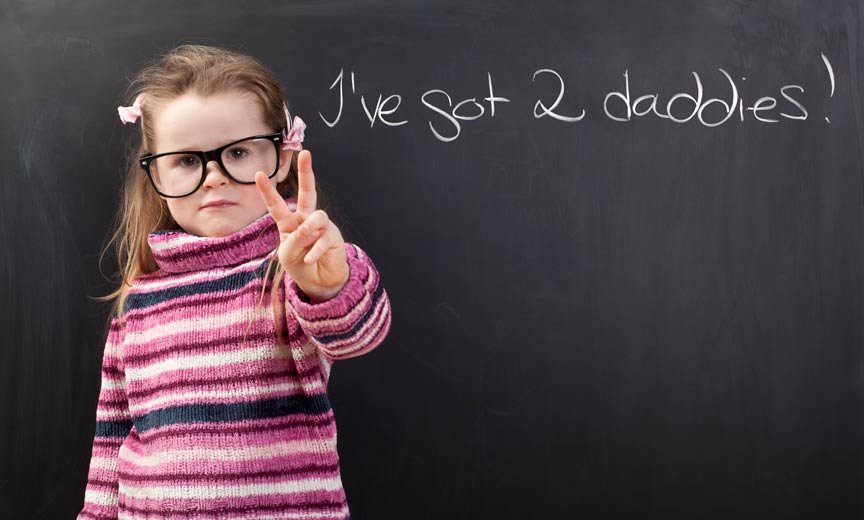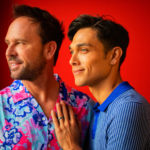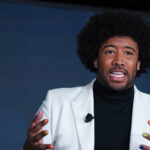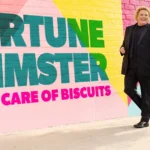Each day, members of our community send kids to school wondering whether they’ll face judgments because of their parents’ sexual orientation. So we sought out some LGBT parents to talk about their concerns, their choices and the values that motivate them.
As gay people continue to move from the margins of society and into the mainstream, increasing numbers of same-sex couples are choosing to expand their families by raising children, while other members of the LGBT community have opted to raise kids as single parents. But even as the military has come to more fully embrace our community with the end of Don’t Ask, Don’t Tell and our unions have gained greater recognition thanks to the Supreme Court’s decisions about marriage equality, many aspiring gay parents are left wondering how their children will be treated in one of the places that shapes them most and parents see them least: school.
Didn’t You Have a Different Mom Last Time?
How an LGBT parent can address the situation depends in no small part on their location and what kinds of school alternatives exist there. Especially in the so-called “red states,” religious freedom laws and bathroom use statutes can send a message that, while we as a people are more free than ever, that freedom is far from universal. For the children of gay parents, those messages of judgment and otherness can cause harm that lasts a lifetime. It may be reassuring that, as Dr. Martin Luther King was fond of saying, “the arc of the moral universe is long, but it bends toward justice,” for the parents of school age children, this is not a rhetorical problem: it’s an issue they must confront every day.
For example, take Kelly and her wife, Rose. Kelly is a white educator and administrator in the Midwest. Both her wife and her son Jackson are black. Their son, she delights in saying, is 11 years old and about to enter the sixth grade. “We got him when he was four days old,” she says with a smile, “so he’s really been with us his entire life.”
At the university where she works, Kelly’s focus revolves around social justice and “all the -isms; you know, racism, sexism, genderism. I concentrate on Intergroup Relations, which means social identities and how that connects to institutions that grant privilege to some members of society while marginalizing others.”
When she leaves her office at the end of the day, she brings those same concerns right back through her front door.
“I don’t know how typical we are, but then who does?” she says. “I have the luxury of living in a college town and working at a university, so I’m not sure where I live is representative of the Midwest as a whole. But here? As parents — and even before Jackson was born — there were issues around race more than there were around sexual orientation. Early on, we found a network of lesbian moms in the largest city nearby. And then we found an LGBT parenting network.” She describes her network of fellow gay parents and neighbors as “quite supportive” and credits them with helping her family largely avoid negative experiences.
Once their son was old enough to attend school, the moms “tested the waters,” Kelly says — making inquiries and talking with other parents especially. To their surprise, “we discovered we were not much of an anomaly. There were a lot of interracial couples, black and white straight parents, too. We were more of a novelty really, and we became in demand because other parents wanted to have their kids exposed to diversity.”
The sea change in attitudes toward gay people was something Kelly saw firsthand as she was preparing Jackson for school. During his earliest years, there was no “second parent adoption,” which meant that — although she and Rose considered themselves equally invested as parents — only one of them was registered as legal guardian. “Still,” she says, “all of his teachers were gracious and saw us the same, and even though they could have insisted that only one of us make decisions about his education, we never had any negative repercussions. We presented ourselves as co-parents, and they never treated us otherwise.”
Kelly says that she and Rose share a few bedrock values: academics, racial diversity and public education. “We both believe in public education and wanted to send our son to a public school,” she attests. “We had pretty smooth sailing for a while, which I appreciate and never took for granted because you don’t get that everywhere. Kids would ask questions about us, and that was fine,” Kelly remembers.
But circumstances changed. “It went from that to teasing and bullying,” Kelly explains. Jackson attended public school for his first five years, but ultimately his moms decided that he needed to relocate.
“I have nothing but good things to say about his teachers,” Kelly says. “But kids in elementary school can get … confused. I would go on a field trip with Jackson, and then Rose would go, and there’d be kids who’d say, ‘Hey, wait a minute: didn’t you have a different mom last time?’”
Kelly says it wasn’t just the kids that changed. “Kids getting older and turning from curiosity to judgment might be partly to blame,” she says. “But I do think the political climate has something to do with it as well. Suddenly it’s okay to be mean to people, and that’s sanctioned in our national conversation because of the president. There’s been so much negativity and misogyny, and it’s like something in the air or water now. It seeps into everything.”

Photo courtesy istock.com/ solstock
The Way We Present Ourselves
Those closer to major population centers have their own unique perspectives. Carter and Nick relocated to New Jersey not long ago from midtown Manhattan with their son Tyler. (The family asked that we refer to them by pseudonyms to protect their privacy.) The move was partly motivated by their plans for Tyler’s education.
In New York, Carter explains, “We were basically next door to a school we were interested in, but ultimately it turned out to be very competitive. In retrospect, we probably should have applied to more schools.” After two years with Tyler in school on Manhattan’s Upper West Side, the couple decided it was time to make a move. “The way New York school is structured, we were going to have to start Tyler in kindergarten when he was four, and we just felt that was too young.”
These days, Tyler is seven and in second grade, attending a school in a New Jersey suburb not far from Manhattan. “You could say we chose the neighborhood and the school together,” says Carter. “We wanted to live in an environment that not only practiced inclusivity in the classroom, but also a neighborhood that celebrated community and was integrated as well. Where we are now, most of the kids go to a school in the zone where they live. It’s important to us that Tyler be able to socialize in his free time with the kids from school, too. That was an important consideration. We’re also fortunate because there are other same-sex parents in the school, and everyone seems very open and accepting when it comes to community, diversity and inclusivity.”
Carter and Nick check in with Tyler on a daily basis to monitor his progress and to generally “get as much information out of him as we can.” So far, they are “pretty happy with his academics” but they also keep a close watch on his emotional and social development.
Outside the classroom, the couple want to make sure Tyler will have a sense of pride about his family and families like them, and so they ‘ve made a point of showing him that every child is lucky to have a parent or a couple who loves and supports them, no matter what they may look like. “It’s important to be visible and supportive of other different kinds of parents,” says Carter. “Part of that is proudly proclaiming that Nick is my husband and the way we present ourselves, and I think that helps give Tyler confidence, too.”
They also emphasize the benefits of sharing their circumstances. “One of Tyler’s classmates has two dads,” says Carter. “It’s helpful to have other LGBT families to reach out to, whether that’s in person or online, so that you have some sort of support system in place. Basically, you want your child to know that they’re not alone and that, while our family may be a little bit different, there are many others like ours, too.”
The Family Ball
Meanwhile back in NYC, efforts are being made to ensure that no matter what the family configuration, parents and their kids feel embraced. Jared Fox, the LGBT Community Liaison for the New York City Department of Education, says that’s been his mission since arriving in January of 2016. “The great thing about New York City is that there are so many schools,” he offers. “No matter who the parents are, they want a good school for their kids. They want to feel affirmed and welcomed. That’s why we provide Parent Coordinators, who are what we consider frontline support for parents. They’re the ones who arrange periodic chats with the principals. They make sure there’s a translator available if one is needed; they organize family diversity nights, and really act as the intermediary between the school and all kinds of parents — inclusive of ethnicity, religion and sexual orientation. When you think of same sex families, it’s really about making room for all families.”
On Fox’s watch, inclusive language has come to the fore, which is how “The Father/Daughter Dance” became “The Family Ball.” But Fox says their efforts begin at the earliest stages of education. “We start in Pre-K,” he says. “We’ve worked hard to find developmentally appropriate material for them, especially because this is their first foray into the New York public school system.”
How would he suggest parents pick the ideal environment to get an education for their child — in NYC and beyond? “Go to schools, make visits, attend open houses,” he recommends. “There are actually fairs where young people can see what an art school — versus another kind of school — is like.”
Fox also acknowledges that as important as it is to find a school that supports same-sex parent-led families, it’s equally important that they appreciate not all such families are the same. “Families are like community, and they’re very rarely monolithic.” He notes that some families need affirmation. Others require integration. Still others need language access. Children do best in schools where the faculty and staff are able to provide students and their families with the tools for success. “That’s why we try to serve New York families in a multi-dimensional way,” he says.
If you missed our 2015 story A Look at Gay parenting, read it and its follow-up article, How We Raised Two Adopted Sons as a Gay Couple on our sister site nymetroparents.com.
Last modified: August 17, 2017













